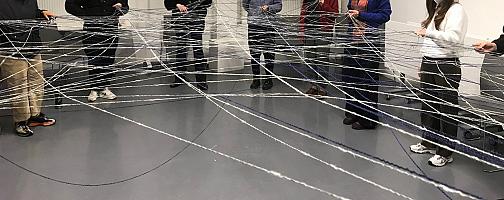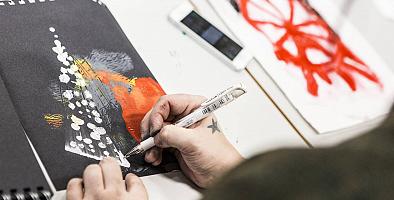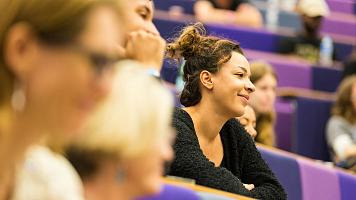MA
Children's Literature
Content navigation menu
Why study MA Children's Literature at Goldsmiths
Expand your understanding of children’s and young adult literature by specialising as a researcher, creative writer, or children’s book illustrator with the MA Children’s Literature programme.
- Develop a well-rounded understanding of children’s and young adult (YA) literature, focusing on its creative, cultural, and commercial impact in the UK and globally.
- Learn from leading figures in children’s and young adult literature, including former Children’s Laureate, Professor Michael Rosen.
- Engage with industry professionals, educators, and literacy advocates who regularly join us as guest speakers.
- Benefit from the opportunity to apply for one of our internships to support the development of your career. In 2024-2025, placement opportunities have been offered with BookTrust, the Centre for Literacy in Primary Education, and Usborne Books, a leading independent children’s publisher.
- Celebrate the importance of culturally relevant books for showing underrepresented readers that they have a place in the world. Our core module – Inclusion and Diversity – examines how texts for young people can challenge and disrupt existing power systems.
- Specialise as a researcher, creative writer, or children’s book illustrator and build a portfolio of work to support you in life beyond the MA Children’s Literature.
- Contribute to Spinning Gold, the online publication led by MA Children’s Literature students, and take part in the Children’s and Young Adult Literature Research Forum, where you’ll connect with fellow researchers and practitioners in the field.
Contact the department
If you have specific questions about the degree, contact Professor Vicky Macleroy or Emily Corbett.
Length
1 year full-time or 2 years part-time
Entry requirements
You should have (or expect to be awarded) an undergraduate degree of at least second class standard in a related field. You might also be considered if you aren’t a graduate or your degree is in an unrelated field. See below for more information and how to apply for the creative writing pathway.
Departments
Educational Studies
English and Creative Writing
What our students say

Pathways
The optional elements of this programme mean you can choose between pursuing a pathway focusing on the study of literature for children in community contexts (Theory and Criticism pathway) or to mainly focus on developing your writing for children (Creative Writing pathway).
MA Children’s Literature: Theoretical Approaches to Children’s and Young Adult Literature (Theory and Criticism pathway)
This pathway is for those who want to specialise as a researcher and a critical thinker. Whether you come from an academic, publishing, education, or children's media background, and whether you are an established professional or just starting out, this pathway will support your development in the world of children’s and YA literature.
It can also prepare you to go on to doctoral-level study.
MA Children’s Literature: Creative Writing for Children and Young Adults (Creative Writing pathway)
Those on this pathway will explore the world of children’s and YA literature, and find innovative and exciting ways to develop their creative writing for diverse readers, while reflecting critically on the process and contexts in which they write.
Children’s Book Illustration
We also offer an MA in Children’s Book Illustration, in which you can immerse yourself in exploring professional and practical approaches to this area. This pathway is jointly delivered by the Department of Educational Studies and the Department of Media, Communications and Cultural Studies.
Please visit the dedicated pathway page to find out more.
What you'll study
You'll complete the following modules*:
| Module title | Credits |
|---|---|
| Inclusion and Diversity | 30 credits |
| Research with Texts | 30 credits |
| The Publishing Industry | 30 credits |
| Children's Literature in Action | 30 credits |
* Note all modules are compulsory except from Children's Literature in Action, which is the recommended option for this pathway.
Final Project
You will complete a Final Project (60 credits). This is a critical enquiry related to theory and criticism in the study of children’s literature or a portfolio that will enable you to engage with critical and practical debates relating to creative writing and work creatively and imaginatively within the constraints of the designated project.
Note about optional modules (if available): The above is indicative of the typical modules offered, but is not intended to be construed or relied on as a definitive list of what might be available in any given year. The module content and availability is subject to change.
Assessment
Taught sessions and lectures provide overviews of coursework themes, which you are encouraged to complement with intensive reading for presentation and discussion with peers at seminars. Coursework essays build on lectures and seminars, so you are encouraged to attend all taught sessions to build knowledge and their own understanding of their chosen discipline.
In depth feedback is provided for written assignments and essays via written feedback forms and formative feedback with module tutors/leads is provided to ensure that your work is on the right track. Feedback comes in many forms and not only as a result of written comments on a marked essay.
Entry requirements
You should have (or expect to be awarded) an undergraduate degree of at least second class standard in a related field.
You might also be considered for some programmes if you aren’t a graduate or your degree is in an unrelated field, but have relevant experience and can show that you have the ability to work at postgraduate level.
Additional requirement for the Creative Writing Pathway
To apply to study on the Creative Writing Pathway you should follow the usual application process, submitting a substantial piece or pieces of original creative writing, up to a maximum of 3,000 words, with your application. This work does not have to be in the form of writing for children/young adults. It will be considered by the module leader of the Workshop in Creative and Life Writing.
Your submission should include one item from the following list:
- One short story
- 7-10 poems
- One or two extracts from a novel
- One or two extracts from non-fiction writing, for example, a memoir.
International qualifications
We accept a wide range of international qualifications. Find out more about the qualifications we accept from around the world.
If English isn’t your first language, you will need an IELTS score (or equivalent English language qualification) of 6.5 with a 6.5 in writing and no element lower than 6.0 to study this programme. If you need assistance with your English language, we offer a range of courses that can help prepare you for postgraduate-level study.
How to apply
Apply directly to Goldsmiths using our online application system
Before submitting your application you’ll need to have:
- Details of your academic qualifications
- The email address of your referee who we can request a reference from, or alternatively a copy of your academic reference
- Copies of your educational transcripts or certificates
- A personal statement – this can either be uploaded as a Word Document or PDF, or completed online. Please see our guidance on writing a postgraduate statement
- Applicants to the Creative Writing Pathway also need to submit examples of their work. Please see the Entry Requirements section above.
You'll be able to save your progress at any point and return to your application by logging in using your username/email and password.
When to apply
We accept applications from October for students wanting to start the following September.
We encourage you to complete your application as early as possible, even if you haven't finished your current programme of study. It's very common to be offered a place that is conditional on you achieving a particular qualification.
Late applications will only be considered if there are spaces available.
If you're applying for funding, you may be subject to an earlier application deadline.
Selection process
Admission to many programmes is by interview, unless you live outside the UK. Occasionally, we'll make candidates an offer of a place on the basis of their application and qualifications alone.
Find out more about applying.
Fees and funding
Annual tuition fees
These are the PG fees for students starting their programme in the 2025/2026 academic year.
- Home - full-time: £11250
- Home - part-time: £5625
- International - full-time: £19000
If your fees are not listed here, please check our postgraduate fees guidance or contact the Fees Office, who can also advise you about how to pay your fees.
It’s not currently possible for international students to study part-time under a student visa. If you think you might be eligible to study part-time while being on another visa type, please contact our Admissions Team for more information.
If you are looking to pay your fees please see our guide to making a payment.
Funding opportunities
Explore the Goldsmiths scholarships finder to find out what funding you may be eligible for.
Funding may also be available from schools’ CPD budgets.
Paying your fees
Find out about paying your tuition fees.
If you are a UK student you may be eligible for a postgraduate loan.
Meanwhile our Careers Service can also offer advice on finding work during your studies.
Additional costs
In addition to your tuition fees, you'll be responsible for any additional costs associated with your course, such as buying stationery and paying for photocopying. You can find out more about what you need to budget for on our study costs page.
There may also be specific additional costs associated with your programme. This can include things like paying for field trips or specialist materials for your assignments. Please check the programme specification for more information.
Careers
Where this degree can take you
The MA Children's Literature can support a new or continuing career in:
- Education
- Publishing
- Children’s media
- Writing texts for children
- Librarianship
- Academic study
- Youth and community work
Skills
Some of the skills you'll develop during the MA Children's Literature are:
- A range of communication skills - including written, spoken, and digital
- An ability to handle ideas in rational, critical, creative and evaluative ways
- Independence and self-management
- Proficiency in assessing evidence and in expressing ideas clearly
- An ability to bring together insights from a range of disciplines
Staff
Professor Michael Rosen
Award-winning author Michael Rosen, who has written more than 200 books and was the fifth British Children's Laureate (2007-2009), is one of the leading lights on the programme. Michael Rosen has authored world-famous classics such as We’re Going on a Bear Hunt and Chocolate Cake.
“It's been very exciting developing an MA in Children's Literature at Goldsmiths, especially as there's a huge appetite for it in recent years. We have potentially a huge number of people who want to study this fascinating subject.
There are so many interesting elements to Children's Literature that perhaps aren't obvious; psychological and anthropological elements for example. Children's Literature is essentially a human practice, it's part of how we initiate our children into life, but also how we begin to shape how they think about and question what they are ”.
Professor Vicky Macleroy
Professor Vicky Macleroy is the Head of the Centre for Language, Culture and Learning and co-Director of the ‘Critical Connections Multilingual Storytelling’ Project.
Dr Emily Corbett
Dr Emily Corbett is the General Editor of The International Journal of Young Adult Literature and Founding Vice President of the YA Studies Association.
Bruce Ingman
Bruce Ingman is a prominent children’s illustrator who regularly collaborates with much-loved author, Allan Ahlberg, and was founding Ambassador for the House of Illustration.
Find out more about staff in the Departments of Educational Studies and English and Creative Writing.





.jpg)